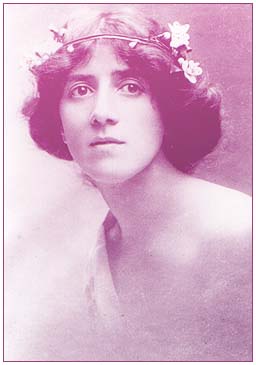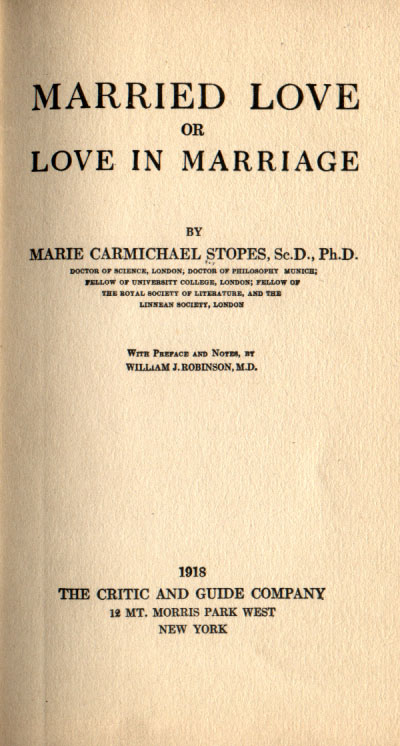
In the sample of letters studied, there were numerous letters from men, who wrote to Stopes asking how they could make their wives enjoy sexual intercourse: “I love my wife very dearly Dr and have longed so to see her be as happy as I can make her”. This shows that there was a dramatic change in the relationship between husband and wife. The wife often wanted a “complete union” and the husband wished to satisfy his wife. Thirty-one respondents wrote to Stopes asking for advice on their sexual problems, and notably they are nearly all men. Eighteen respondents asked for advice on marriage issues and it shows an active concern to create the ‘ideal’ marriage that Stopes illustrates in her manuals. Holtzman noticed in her sample of correspondence that there was a significant amount of women, who were disappointed about their inability to experience sexual pleasure: “We have tried every way to have a complete union which will bring me the desired result.” Holtzman’s female respondents’ dissatisfaction in the lack of sexual pleasure indicates that they shared a common expectation about the universality of achieving sexual pleasure. Stopes’ ideal of the perfect marriage, it seems, was unobtainable by many.
Nonetheless, the influence of Married Love cannot be denied. Those who did manage this “mutual adjustment” received the full benefit of a happier and equal marriage. Those who were unable but were seeking to achieve “mutual adjustment” shows that there was an active willingness to change the relationship, which indicates progress. As a result of an absence of contact with other sources, Married Love had a more far reaching impact on women than just forming their expectations of marriage and sexual intercourse; it gave women the vocabulary to discuss their sexuality. Holtzman discovered that the language used by the women in their letters was very similar to that of Stopes’ books. I also found in my sample of correspondence that many used terms like “complete orgasm”, “union” and some even quote her book back to her, perhaps embarrassed or uncertain to describe their own sexuality and problems. Stopes even recognised that Married Love was influential on the language of sexuality: “its phraseology become part of the national vocabulary”.
Stopes’ main influence, Holtzman argues, was on women in interwar society with her creation of a sexual role for them within marriage, especially considering the social changes that were occurring in the aftermath of the First World War. Women were encouraged to give up their jobs and return to the domestic sphere. High rates of unemployment, the rise of contraceptive technology coupled with uncertain times meant that there was a declining birth-rate in the middle-classes, which caused the female role as mother that had dominated the domestic sphere to become increasingly less important. With reducing significance of motherhood as women had fewer children combined with the decline in economic independence outside of marriage, Stopes provided middle-class women with a sexual role. This attracted middle-class women who felt that their traditional roles within the home were becoming less significant. Holtzman argues that Stopes was just enhancing an existing sense of power, because there had been a steady decline in the birth-rate within the middle-class due to women asserting sexual authority in the absence of widespread contraceptives. Holtzman’s argument is interesting, but she neglects the sexual role of women had a wider connotation than merely replacing diminishing roles within the home. Holtzman undermines the importance of the sexual role making women equal partners in marriage and ignores Stopes wish to further female equality in marriage, so women could “possess as much intellectual freedom and freedom of opportunity within it as do their partners.” In her study of Stopes, Holtzman neglects working-class women.
Marie Stopes never wrote or directed any part of her two marriage manuals, Married Love and Enduring Passion, to help and reform working class marriages. Many of feminist arguments were derived from the feminist movement, which was primarily a middle-class movement. Feminism only had a diffuse impact on the working-class women when Stopes used it to support the limitation of working-class children. The emergence of marriage manuals like Stopes’ Married Love and Enduring Passion (1928), which explicitly referred to sexual intercourse as something to be enjoyed not just for reproduction were intentionally addressed to respectable middle-classes. This did not mean that the working-classes, particularly women from the artisan and ‘skilled’ section of the working-classes, were not exposed to her marital ideology. Since the late-nineteenth century, ‘skilled’ labourers of the working-classes benefited from increasing wages allowing them to afford, in theory, Stopes’ books.
Although Married Love had a limited readership, its popularity ensured that many knew about her ideology. Stopes’ ideology was revolutionary as it promoted female liberty and sexual pleasure in marriage, but at the same time it was in some ways still very conservative. Stopes only advocated heterosexuality and marital sex. In the interwar period there were advocates of free love and homosexuality, which did not base their ideology of sexuality within marriage, but Stopes’ was not revolutionary enough to support such a controversial issue. Hera Cook argues that Stopes did not extend sexual equality as far as she could have as she did not advocate in any of her works that women should dominate the sexual relationship. Instead Stopes advocated equality of the sexes in marriage. Women were no longer sidelined as the domestic, passive and weaker sex:
“This ancient weakness of her sex must be conquered, and is being conquered by the modern woman.” Women became an active partner in the marriage relationship and Stopes notes how hard it is for “two people of different opinions to retain their own opinions without each other endeavouring to convert or coerce the other”, but essentially it is what marriage should be like:
"While modern marriage is tending to give ever more and more
freedom to each of the partners, there is at the same time a
unity of work and interest growing up which brings them together
on a higher plane than the purely domestic one which was so
confining to the woman..."
Stopes acknowledges that the restricting shackles from the “shadow of the coercive and dwarfing influences of the past” were being eschewed for female freedom: “one sees a widening of the independence and the range of pursuits of women.”
Marie Stopes’ Married Love transformed the marital relationships of those who read it. While Stopes agreed with feminists, who argued that marriage should not give the husband the right to demand sexual intercourse, Stopes broke away from the feminist acceptance of the common belief that women were passionless, which only served to reinforce conjugal rights. Stopes depicted the female body as actively sexual at a physiological level, and combined with her theory of periodicity, she gave women the chance to refuse or accept her husband’s sexual advances without been named “frigid” or “depraved”. Stopes’ separation of sex and reproduction was a novel creation and gave women a sexual identity of their own. This manual opened up discussions between husbands and wives on sex, birth-control and marriage. Perhaps Stopes was not as revolutionary as many were in her era but her policies were controversial and made an impact.
F.Y.I: This is copyrighted ©
"While modern marriage is tending to give ever more and more
freedom to each of the partners, there is at the same time a
unity of work and interest growing up which brings them together
on a higher plane than the purely domestic one which was so
confining to the woman..."
Stopes acknowledges that the restricting shackles from the “shadow of the coercive and dwarfing influences of the past” were being eschewed for female freedom: “one sees a widening of the independence and the range of pursuits of women.”
Marie Stopes’ Married Love transformed the marital relationships of those who read it. While Stopes agreed with feminists, who argued that marriage should not give the husband the right to demand sexual intercourse, Stopes broke away from the feminist acceptance of the common belief that women were passionless, which only served to reinforce conjugal rights. Stopes depicted the female body as actively sexual at a physiological level, and combined with her theory of periodicity, she gave women the chance to refuse or accept her husband’s sexual advances without been named “frigid” or “depraved”. Stopes’ separation of sex and reproduction was a novel creation and gave women a sexual identity of their own. This manual opened up discussions between husbands and wives on sex, birth-control and marriage. Perhaps Stopes was not as revolutionary as many were in her era but her policies were controversial and made an impact.
F.Y.I: This is copyrighted ©


